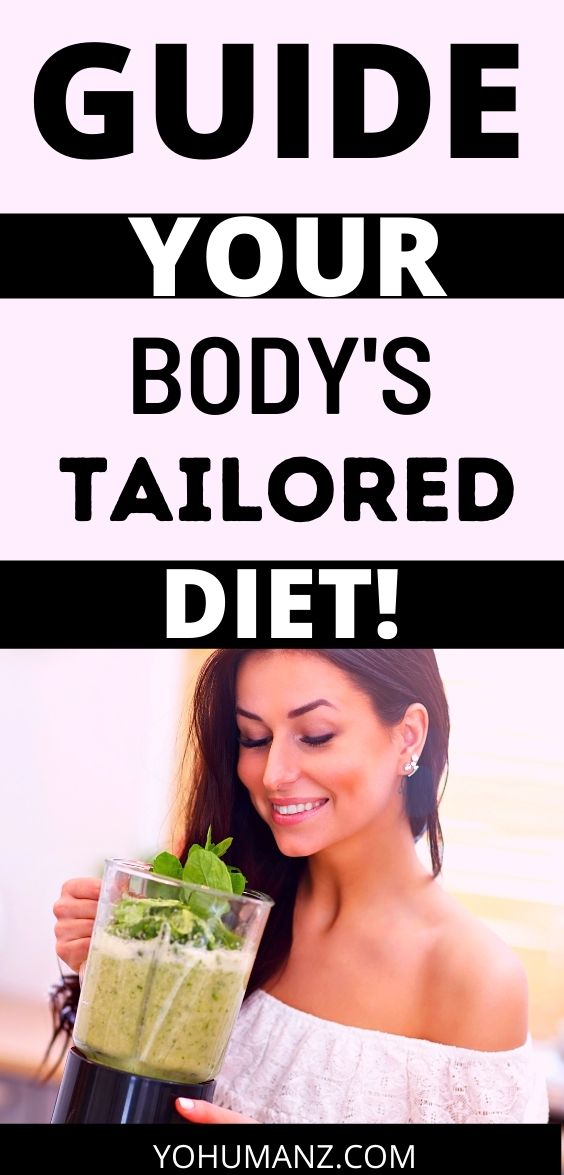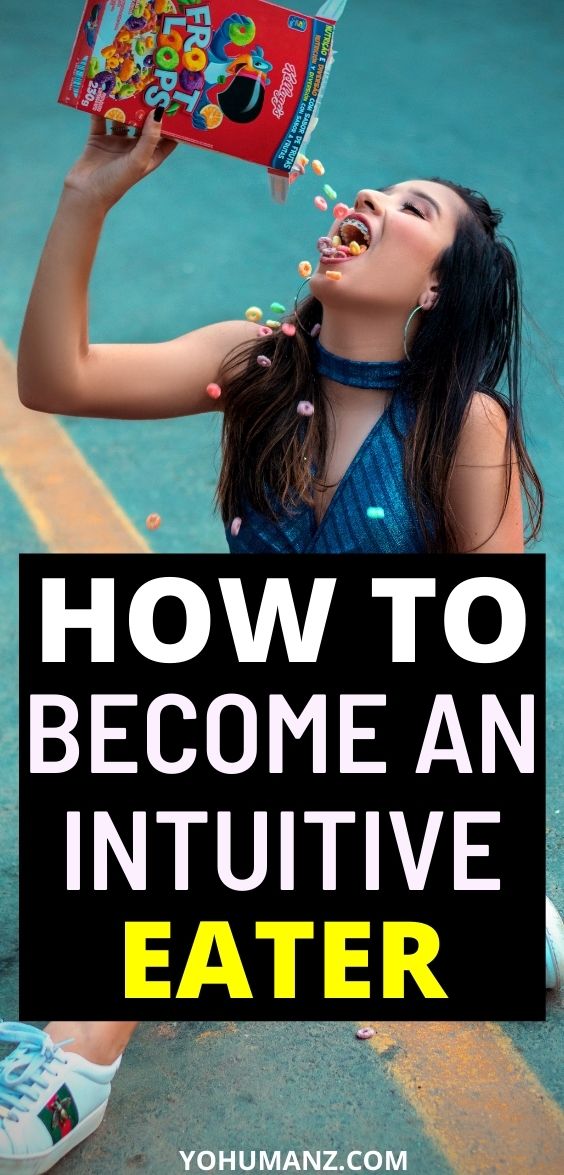Table of Contents
Are you tired of diets yet?
Only eating grapefruits. Smoothies for life. Or worst, energy bar-shaped cardboard with “meal points.”
The diet industry is making bank off you, but your mind and body gets more depleted by the day.
It’s not your fault.
It’s no secret that diets don’t work.
“But I lost weight,” you may say.
Well, did you gain it back?
Probably. Because diets don’t work.
Intuitive eating is an alternative that guides you about when to eat without any strict rules. It teaches you how to love your body and food again. It helps maintain or adjust your weight to a healthy size for your specific body.
Sounds good, right?
Read on to learn about what intuitive eating is and how you can take advantage of its benefits.
Intuitive Eating Definition
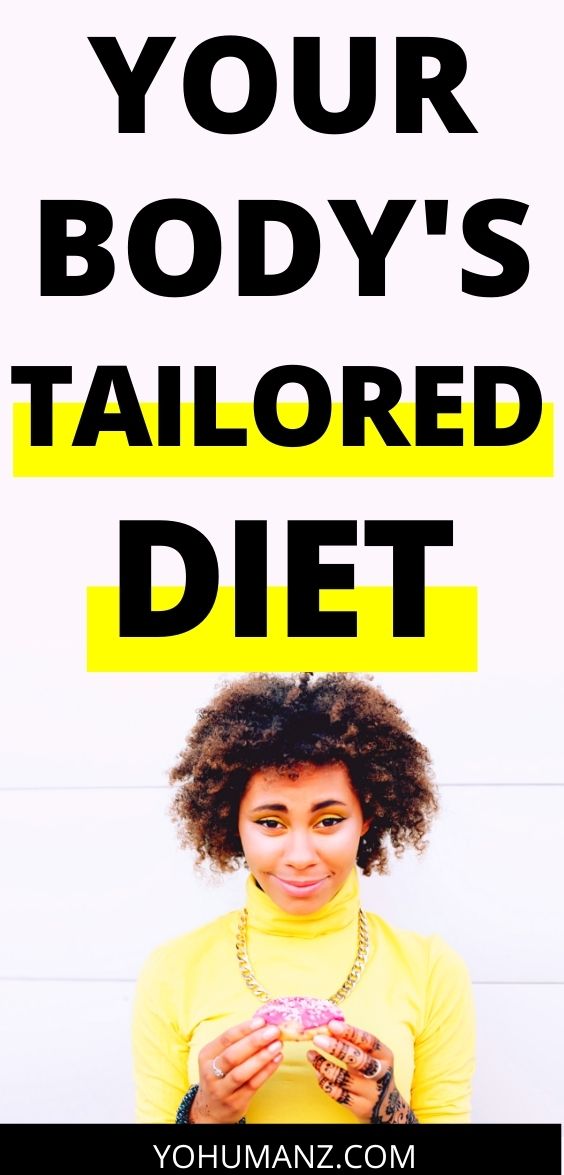
A simple intuitive eating definition is “a way to eating that honors your instincts.” While many diets will tell you to eat specific foods at specific times, intuitive eating allows you to eat whatever and whenever your body signals. Upon first thought, you may think it’s a wild idea that will lead you to eat a lot of unhealthy things. But the theory is that you’ll learn to listen to your body’s natural hunger cues while differentiating them from emotional eating. You’ll use an intuitive eating hunger scale to assess how hungry you are and whether you should eat. When you eat, you’ll pay attention to signs when you’re comfortably full and you’ll stop eating. This stops up from eating until we’re stuffed or binge eating.
In this way, intuitive eating isn’t an actual “diet,” it’s more of a lifestyle change that you use long-term.
The idea behind intuitive eating is that it your body knows what it needs. But often, we’re influenced by external factors like fad diets, trends, friends, etc. This quiets our natural cues to the point where we can’t recognize them. Another part of the intuitive eating definition is about recognizing emotional eating. Many of us mistake or knowingly eat when we’re not hungry, but need to soothe our anxiety, sadness, loneliness or boredom.
Teaching ourselves to get back in touch with our body will lead us to eat when and what we’re supposed to. As a result, our body weight will adjust (or be maintained) to what it naturally should be.
Intuitive eating can be a great tool for people with disordered eating habits because it helps you approach eating, exercise and body image from a realistic and healthy mindset.
The idea of intuitive eating was created and refined by two dieticians, who wrote a book called “Intuitive Eating” in 1995. Since then, the concept has been studied and has led them to publish a workbook and another book directed toward teens. Many other experts now write and teach using intuitive eating ideas and scales.
Will Intuitive Eating Help Me Lose Weight?
One major question is “will intuitive eating help me lose weight?”
Intuitive eating can result in maintaining your weight or losing or gaining weight, depending on what your body needs. When you start learning about this lifestyle, you’ll start recognizing any unrealistic standards you may have.
For example, if your goal is to be size 0 and your hips are wider set, that isn’t a realistic or healthy goal for you. Intuitive eating has you question your mindset about what is ideal for your body. Accepting your body as it is and working toward its most healthy state is the goal. If that means losing weight, that’s possible with intuitive eating. As you’ll discover in the section below, several studies have shown that higher intuitive eating scores are associated with lower body mass index (BMI).
With that being said, intuitive eating put the emphasis on mental processes around weight. Instead of wanting to lose weight to be thin and attractive and the “ideal” version of beauty, you’ll be asked to consider more reasons why it’s important. For example, perhaps a lower weight means easier moving around or more energy for you.
Intuitive Eating Principles
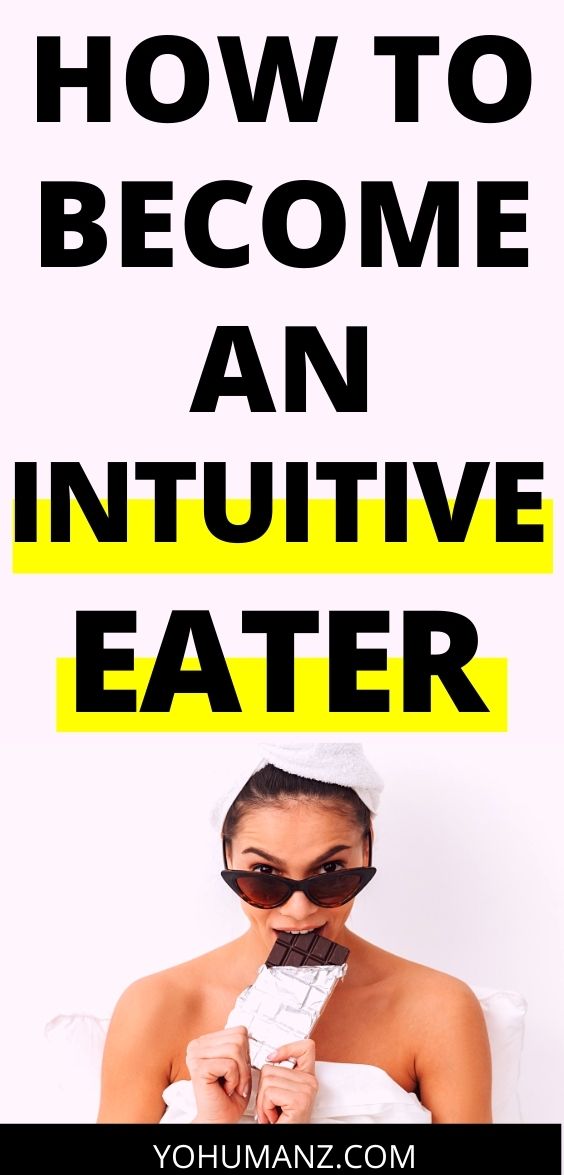
To help you better understand the concept of intuitive eating, the authors of “Intuitive Eating” outline 10 concepts in their book. These are general rules of what the concept stands for. You can see them explained in full here.
- Reject Diets– Get rid of all hope that diets will work. They don’t. It’s a lie.
- Honor Hunger– Follow your hunger cues
- Make Peace with Food– Stop forbidding types of food and fighting urges
- Challenge Food Police– Stop seeing yourself as “good” or “bad” because you ate foods
- Learn Satisfaction- Find pleasure and satisfaction from food experiences.
- Feel Fullness– Listen to body signals to know when you’re full.
- Give Kindness to Emotions- Find ways to cope with your emotions that don’t involve food.
- Respect Your Body- Accept yourself and your body. Have healthy and realistic body “ideals.”
- Movement– Stop having rules around exercise, just get active and feel the differences (ex. energy increases not calorie burning).
- Honor Health– Make food choices that respect your health but don’t restrict yourself to perfection.
Intuitive Eating Hunger Scale
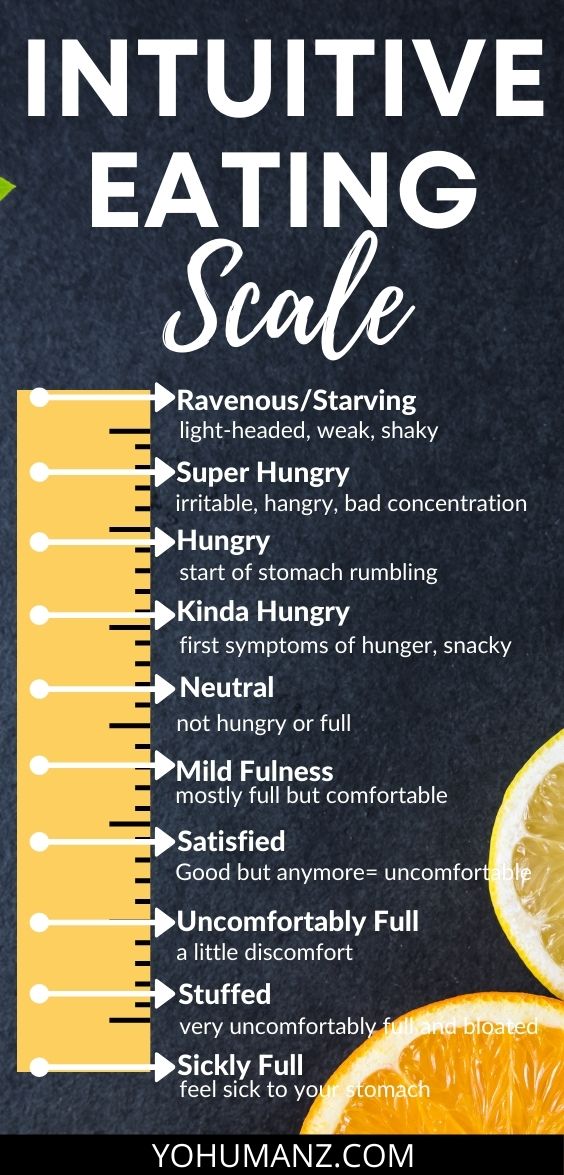
When you begin approaching food in this new way, you’ll be introduced to the intuitive eating hunger scale.
In short, the intuitive eating hunger scale helps you rate your hunger levels, letting you know whether you should eat and when you should stop eating.
The scale goes from 1-10 with each number corresponding to a different level of hunger. 1 is ravenously hungry and 10 is physically ill from being so full.
How to Use the Intuitive Eating Hunger Scale
The intuitive eating hunger scale is easy to use. We recommend keep a physical copy or one on your phone so you always have it handy to refer to.
You can look at the scale when you’re thinking about eating or wondering when you should stop eating. Think about your physical hunger sensations and choose the number on the scale that most closely relates.
In the beginning, to get used to your body’s natural cues, you may use the scale several times every day. This is a good way of making yourself consciously consider your hunger. But overtime, thinking about your hunger level will probably become a habit, meaning you don’t need to refer to the numbers anymore. Intuitive eating doesn’t have strict rules, so do what works for you!
In general, here are the meanings of the numbers on the intuitive eating scale.
- Ravenous/Starving (may include light-headed, weak, shaky)
- Super Hungry (may include irritable/”hangry”, difficultly concentration)
- Hungry (may include start of stomach rumbling)
- Kinda Hungry (may include first symptoms of hunger, feeling snacky)
- Neutral (not hungry or full)
- Mild fulness (mostly full but comfortable)
- Satisfied (comfortable but anymore could be uncomfortable)
- Uncomfortably fully (may include a little discomfort)
- Stuffed (may include being very uncomfortably full and bloated)
- Sickly Full (may include being so full you feel sick to your stomach)
Numbers can be intimidating to some people, especially if you’re used to using them in a negative way—such as counting calories or meal points. If this is turning you off of the intuitive eating hunger scale, consider ways to reframe it so that it works for you. For example, the numbers can be replaced by letters or colors if those have a more positive connotation to you.
General Intuitive Eating Hunger Scale “Rules”
The point of intuitive eating is that there’s no rules because you’re following your own body’s natural cues. As such, the scale numbers may mean slightly different things to different people. However, here’s some general recommendations to help you use the scale.
- Start eating around 3 or 4 level hunger—you’re not uncomfortably hungry yet and since your blood sugar is still ok, you can make rational food choices. Of course, sometimes you get busy and eat around 1 or 2. That’s ok but it’s better to begin eating before our body is yelling at us to do so.
- Stop eating around 7. This leaves you satisfied but not feeling overly full. Sometimes you’ll eat until a level 8 and that’s ok too. It’s better to stop eating before you become uncomfortably stuffed. Other times, you might stop eating around level 6 so you have room for dessert! Again, these are general concepts to help guide you.
Intuitive Eating Studies
Many of today’s diets aren’t approved by science. In fact, have a yo-yo affect, making your gain back the weight almost as quick as you lost it. This leads to unhealthy mindsets and it’s bad for your body too. Most studies show that diets just don’t work.
In contrast, intuitive eating is recommended by many doctors, therapists and dieticians. That’s because there’s a good body of evidence to prove its effectiveness on multiple levels.
In this section, we’ll run through the benefits studies have found.
Mental Health Toward Body/Food
People who trust their bodies to eat were less likely to have disordered eating behaviors, according to a 2012 study. Women had less chances of chronic dieting and binge eating. Researchers concluded doctors should discuss the concept with patients to promote healthy weight. Another study found intuitive eating WASN’T related to body dissatisfaction and pressure for thinness or the internalization of thin as the ideal. Further, it’s been linked to fewer dieting behaviors and fewer food anxieties.
Better Than Diets
A 2006 study compared those on a diet to those practicing intuitive eating. Those who practiced intuitive eating maintained long-term behavior change and improved all outcomes, but the diet group did not and their weight was regained.
Weight Loss/ BIM Improvement
A 2013 review of research found “significant and consistent” associations between intuitive eating and BMI and psychological health. Another study found that higher intuitive eating scores meant lower BMI. A 2016 study mirrored this data, finding that intuitive eating was associated with decreased BMI.
There’s way more studies though. To see a full list, see their summaries on the original Intuitive Eating website.
How to Become an Intuitive Eater
To become an intuitive eater, it’s best if you pick up a book or program that can guide you through the process. We recommend the original book. Reading more material will help better outline intuitive eating processes. This is important because a large part of this concept is addressing emotional and phycological factors (ex. emotional eating). It will also help in troubleshooting issues you may have.
With that being said, to become an intuitive eater, you need to follow your body’s cues. You start eating when you’re hungry and stop when you’re comfortably full. When you want to eat and you’re already full, you question the reason for your “mental hunger.” What do you really need? If you’re feeling bored, perhaps you do an activity with your hands instead of reaching for a snack. If you need comfort, maybe you snuggle with a pet instead of continuing to eat.
As an intuitive eater, you also don’t judge yourself for craving some foods traditionally labeled as bad. You have self-compassion and moderation. For example, if you’re craving a cupcake, you don’t try to replace that craving with a carrot. Often times, this leads us to eat the cupcake anyway, but way more than we need to since we’ve deprived ourselves. Instead, you’ll eat the cupcake until you’re satisfied. Maybe that’s a few bites and then you move on with your day.
It’s important to realize that intuitive eating is a process and a lifestyle. Unlike dieting, there isn’t an end goal you reach and ditch the concept. It’s a tool you work with to help your body be healthy. Sometimes, you’ll start and stop eating exactly when your body needs. Other times you’ll misread or ignore signs or get busy and the scale goes out the window altogether. But you’ll come back to it. Remember to have self-compassion always.
Intuitive Eating Blogs
If you’re starting on your intuitive eating journey, it’s a good idea to follow some blogs that can help you. Instead of going to magazines and diet blogs, switch your go-to to some intuitive eating blogs. Here are some options:
- Intuitive Eating Blog– Blog from the website of the original creators of the intuitive eating process.
- Rachel Hartley- Rachel is a certified intuitive eating counselor and dietician. Her blog features many posts about intuitive eating.
- Alissa Rumsey– Alissa is a nutrition therapist and a certified intuitive eating counselor. She has a blog category all about tips for intuitive eaters.
- Sarah Berneche– Sarah is an anti-diet nutritionist and certified intuitive eating counselor. Her blog deals with topics like binge eating and intuitive eating on specialized diets like plant-based diets.
- Dare Not to Diet– This blog focuses on ditching dieting mentality, eating disorders and food stress with a category for intuitive eating.
- Eatuitive– Eatuitive talks about quitting diets, fullness and body image from an intuitive eating perspective.
- Nutrition By Elissa– Elissa is a dietician who talks about problems with diets, gentle nutrition and intuitive eating.
Summary on How to Become an Intuitive Eater
Intuitive eating is a lifestyle change rather than a diet. The basic concept is that you respect your hunger cues, meaning you eat when you’re hungry and stop when you’re comfortably full. If you’re hungry and don’t have physical cues, ask yourself why and what else you can do to cope with that emotion. As we learn to respect our bodies and stop fighting food, we can start enjoying it and better deal with our emotions in a genuine way.
